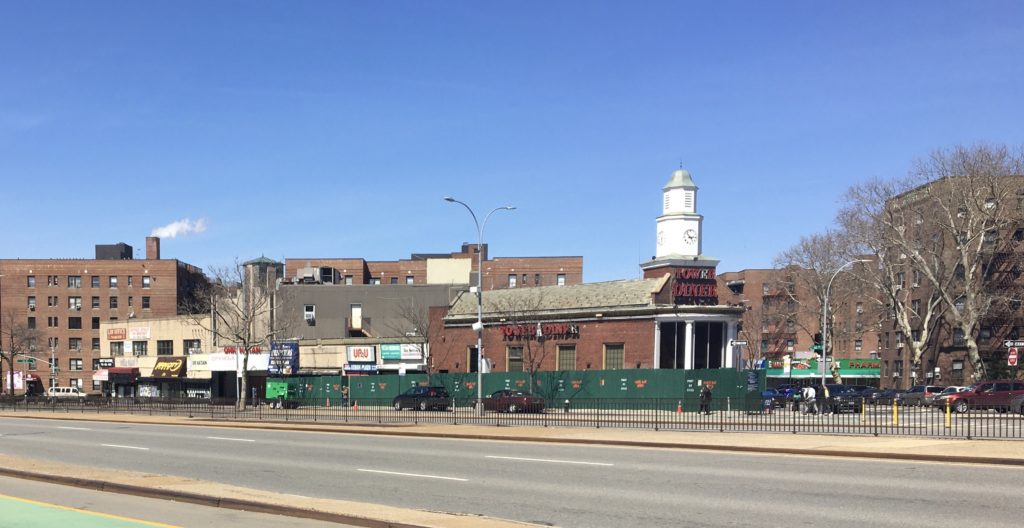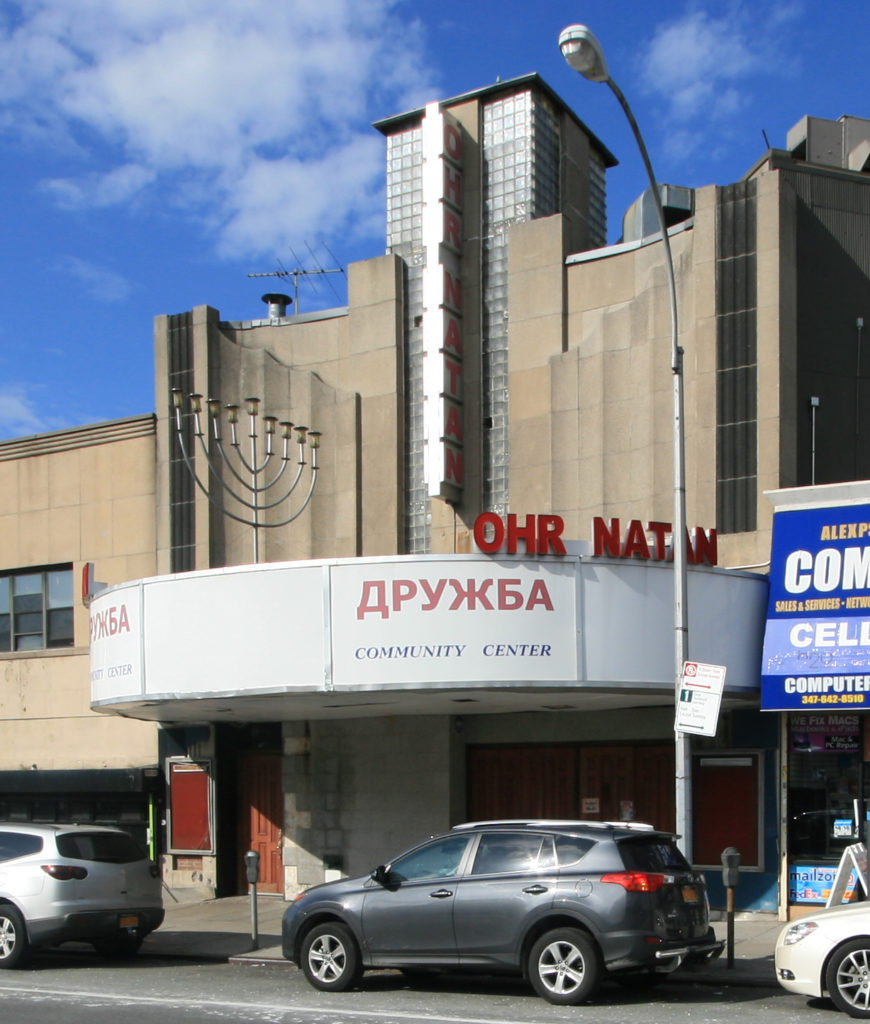By Michael Perlman
mperlman@queensledger.com
Last week, a demolition crew arrived in front of the historic Tower Diner Clock Tower Bank Building, and a construction fence was erected, extending around the Queens Boulevard and 99th Street small businesses.
Tower Diner has been a community anchor for generations, but its regal Colonial bank-inspired interior is being gutted first, and the demolition crew said it will be demolished possibly in two weeks, followed by the Art Deco 1939 World’s Fair-inspired Trylon Theater, later known as Ohr Natan Synagogue & Community Center.

Tower Diner Bank Building & shops surrounded with a fence
In 2010, it was a miracle how the block survived a major fire and was restored. Additionally, it survived the pandemic. Residents are calling for preservation and respect for architecture, culture, history, religious values, morals, and small businesses. On a few occasions in recent months, developers Rudy and Michael Abramov of RJ Capital Holdings/Trylon LLC stated at public hearings and a recent City Council committee meeting that they are willing to work with the community to acknowledge preservation requests and revise the 15-story condo renderings by incorporating the prominent facades, but residents are now saying that the developers are dishonest by planning to destroy historic community icons.
An engineer brought in by Rabbi Kaziev assessed the property and revealed that it can accommodate a harmonious development above, but the developers dismissed this preservation approach. The loss of this historic block would add to recent travesties including the historic Parkside Chapel.
Over 4,200 residents among preservationists signed an online petition (https://www.change.org/p/rj-capital-holdings-save-historic-trylon-theater-ohr-natan-tower-diner-small-businesses-from-demolition) and posted heartfelt comments, and others wrote letters to Councilwoman Lynn Schulman, Borough President Donovan Richards, and Community Board 6, as well as testified at hearings. Elected officials have been working with the developers, and the community is calling upon all parties to respect their wishes.
BP Richards stated in his advisory report, on January 7, “I hereby recommend disapproval of this application, unless all of the conditions are met,” and among them is “The proposed development should significantly incorporate prominent architectural features of the Trylon Theater and Tower Diner facades wherever possible.”
The majority of Bukharian congregants who worship at Ohr Natan and faced oppression in their native countries are now facing being exiled from their synagogue, an American Dream second home, shaped with much love. Congregants also feel it is a sin to demolish a synagogue, particularly against their will. Plans are underway to relocate to a $.99 cents store across the street after the developer pressured Ohr Natan for years.
“The fact that the developers are replacing our synagogue, in which many Bukharian Jews observe their religion, is very devastating to me,” Michael Yakubov said. “It was a very beautiful synagogue, which I went to learn Hebrew and listen to religious lectures. Ohr Natan brought our Jewish community closer to one another, especially on holidays. Forest Hills has definitely been evolving, but not in a good way. Our area is becoming more congested, and our community is falling apart.”
Inmaculada Gattas explained, “I felt terribly upset after seeing Tower Diner boarded up and knowing that Ohr Natan Synagogue/Trylon Theater will close, without given the respect that preservation gives to religious and historical buildings, and sites that have proven to be of great spiritual and physical importance.” She pinpointed the greater picture. “The buildings facing demolition and ones that we already lost, represent the soul and energy of the people that built them with blood, sweat, and tears. Their imminent destruction highlights the fact that nothing is sacred to these developers and the politicians who allowed it. I truly hope there’s still time to save at least some of the artwork and architectural elements.”
Residents feel that the NYC Landmarks Preservation Commission is not applying the Landmarks Law equally between boroughs.
“We are losing yet another of our neighborhood’s cultural centers,” Theresa Doria said, citing the Elmwood, which is now a church, as an example of adaptive reuse, but it is still serving the community. “We’ve lost so many glorious movie and Vaudeville theaters, and trying to get any worthy site landmarked in Queens is just impossible! Both the Tower Diner and the Trylon should be landmarked based on their unique architecture.”
She also mourns the loss of the displaced mom-and-pop shops, where some did not reopen elsewhere. “We not only lose a large place to gather and worship, but we lose a place to gather and eat. We’re losing mom and pops left and right to overtaxing, and bus and bike lanes taking the parking away.”
Resident Sylvia Bloomfield, who has lived near the site for the last thirty years, feels depressed by the decision for the destruction of Tower Diner, a unique destination for her family and friends.
She said, “We knew the owner and employees by first names and enjoyed many laughs, and the clock tower is a historic site.” Furthermore, she said, “Ohr Natan is a place where the community gathered to worship our Creator. It was promised at a meeting and verified by an engineer that the building being erected can keep these historic buildings, but now our community will suffer a severe loss. Please be conscious enough to let these buildings stand and preserve the integrity of our community.”
Linda Creash recalled Emigrant Savings Bank, and how the diner cared to preserve its beautiful design. “Sadly, the developer has no regard for the preservation of historic facades, although he previously said he did. I think back to the destruction of Penn Station, a magnificent building lost to the wrecking ball, but to me and so many others, the imminent loss of the beloved Tower Diner and the Ohr Natan is immeasurable. Once again, we who live, shop, and vote here have no say. Greed and money speak louder. It’s a sad fact, and like Penn Station, regret will come too late.
“Rego Park is morphing into a glorified suburban hellscape on steroids, with the same stores you see everywhere, and like the Walking Dead, we are all becoming infected involuntarily by the blandness of it all,” said Alan Tompas. He called it “zombies to big-time commerce.”
He can never understand the lack of respect for architectural history New York has. “From the vandalism of Penn Station to the total ignorance of preserving anything that stood where old Yankee Stadium was, it just makes no sense,” he said. Being raised in Rego Park, he felt it was a genuine neighborhood with a feel of its own. “I never got the sense that a new business was only propped up for the sole purpose of making money. You knew the storeowners, loved the shops, and you played with all the kids you grew up with.”
As for Tower Diner, he said, “In its place, expensive condos with no sense of architectural aesthetics are being planned, but where are the stores, the diners, and the places people like to congregate? To add insult to injury, the old Trylon Theater won’t be saved either. It’s a holdover from the 1939 World’s Fair!”
Joshua Robert attributes this dilemma to political abuse. “I think our politicians do not care at all about what their constituents want. They deal in lies, and lies are a business. They deal in promises to those most likely to donate, rather than those most likely to vote, and if the public interest and their interest diverge, then it’s the public who loses,” he said. “We don’t need another faceless, soulless apartment building and yet another construction site. We don’t have the infrastructure to pack more people, but yet everyone seems to ignore that except for the residents left behind.”
“It feels like your religion can be sold to the highest bidder,” Loreena Lano, who is also concerned with an influx of people to an already overcrowded area, said. “There’s not enough schools, hospitals, infrastructure, and services. Even if they built above it and preserved the structures, it’s overdevelopment and all because money rules and all else suffers.”



